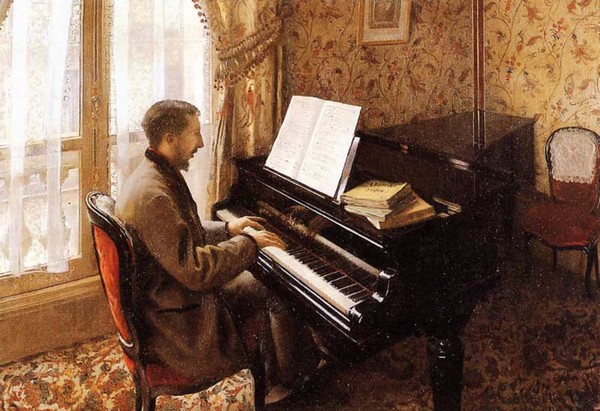
A few weeks ago I saw in Instagram some pictures of a new Lied festival in Germany. I realized that many Lied festivals had appeared during the last few years and I thought I could talk about them, to celebrate with readers that, as one of the most usual song-related hashtags says, #dasLiedlebt (the Lied is alive). You never know, maybe we will coincide with some of these events in a city break. Or maybe we will check the programme and will organize that city break.
- Shipston Song. The newest festival I'm presenting is so new that it hasn't been released yet. The first edition will take place from 23 to 25 September in Shipston-on-Stour, a town in the Cotswolds, England. They will be three concerts under the artistic direction of pianist Ian Tindale. I hope that by the end of September we will hear about it!
- Brentano Akademie. This is the festival that started this article. It took place between 6 and 11 June in Aschaffenburg (the city where Clemens Brentano lived his last years) and his artistic director is tenor Julian Prégardien. It will be biennial; between festivals it will hold academic activities and, each autumn, a Wunderhorn Wochenende, that is, a Wunderhorn weekend (as you may remember, Brentano is, along with Achim von Arnim, the compiler of Des Knaben Wunderhorn, the collection of traditional poetry that every lied lover knows)
- Projeto: Canção. Three pianists, Pedro Costa, João Araújo and Luís Duarte, founded the Associação Portuguesa de Lied last year with the aim of spreading the chamber song in that country. Between 4 and 8 May, the first edition of the Projeto: Canção was held in Porto, with concerts and interpretation masterclasses. The association has a wonderful, big task in front of them!
- Schubertiade Wieden. Wieden is one of the districts of Vienna, and there, in the Palais Ehrbar, the youngest Schubertiade was born in November 2021, run by pianist Alejandro Picó-Leonís; the concerts of the first festival spread over six months, the last one was on 5 June. We don't know the dates for the next one yet, but we'll be aware.
- Lied in Würzburg. This festival, founded by pianist Alexander Fleischer in 2018, was about to disappear, victim of the pandemic. Fortunately, the third edition took place recently, eight concerts and an interpretation course between April 19 and May 1st. Let us hope that, once this difficult time is over, the festival will continue next year.
- RHONEFESTIVAL. Soprano Franziska Heinzen founded in 2018 this festival in Brig, in the Swiss Alps. The concerts are free and take place in different places, including the banks of the Rhône. The first concerts this year were in May, but it's not yet too late for the concerts in July (every Saturday) and for a last concert in November.
- Liederleben. Pianist Akemi Murakami is the artistic director of this festival that was born in 2017; if I am not wrong, the name is a smart play on words because "leben" is to live and "erleben", to experience. The concerts are widely distributed over time this year, they started on 14 March and will end on 7 October, so we can still go to Munich, which is always a pleasure, and enjoy the two left concerts at the Residenz.
- Hidalgo. Also born in 2017 in Munich, this festival could be described as "alternative". It takes the name from a Lied by Schumann, Der Hidalgo, and its motto is one of his verses: "Auf denn zum Abenteuer" (Off then, to adventure!). The festival avoids concert halls and performs recitals in hotels, car parks, hairdressers, or outdoors. I haven't been able to find who is in charge (the website speaks of "a small, enthusiastic group of friends") or the exact dates of the next edition, which appears to begin on 10 September.
- Internationaal Lied Festival Zeist. We arrive at the Netherlands with the oldest festival on this list. The first edition took place in the spring of 2016 with the artistic direction of baritone Robert Holl, and was dedicated to Franz Schubert (that's always a good way to start). From this year's edition, which took place between 13 and 22 May and had as motto "Auf Flügeln des Gesanges", artistic directors are baritone Henk Neven and pianist Hans Eijsackers.
I am aware that I overlooked some festivals: I am also aware that I limited to Europe, while many readers of this blog are in America; if you want to share some other Lied festival in any place of the world, I will be really grateful.
As always, you'll find more information about festivals and seasons on this website, on "Concert Hall" menu. On Seasons in Europa, the most experienced festivals and concert halls are linked; on Song Recitals in Catalonia, you'll find the next recitals thanks to agendaclassica.cat.
To illustrate his post, I'm suggesting that we go over Der Hidalgo; we listen to this Lied almost nine years ago and back then I explained the happy circumstance that inspired it; if you want to refresh that story, here it is. This time we're listening to this song, with poem by Emanuel Geibel, performed by Heinrich Schlusnus and Sebastian Peschko.
Time to end the regular season. June is ending, and for many of you it's time to relax, maybe to switch off the phone or the computer... As usual, Liederabend doesn't take any holiday, at least until September, and during July and August I'll post a short article about the concerts of the Schubertíada every week. I hope that those who are coming to Vilabertran will find this useful, and that those who cannot come will enjoy the new song presented.
But for the moment, enjoy Schumann!
Es ist so süss zu scherzen
Mit Liedern und mit Herzen
Und mit dem ernsten Streit!
Erglänzt des Mondes Schimmer,
Da treibt’s mich fort vom Zimmer,
Durch Platz und Gassen weit;
Da bin zur Lieb’ ich immer
Wie zum Gefecht bereit.
Die Schönen von Sevilla
Mit Fächern und Mantilla
Blicken den Strom entlang;
Sie lauschen mit Gefallen,
Wenn meine Lieder schallen
Zum Mandolinenklang,
Und dunkle Rosen fallen
Mir vom Balkon zum Dank.
Ich trage, wenn ich singe,
Die Zither und die Klinge
Vom Toledan’schen Stahl.
Ich sing an manchem Gitter
Und höhne manchen Ritter
Mit keckem Lied zumal,
Den Damen gilt die Zither,
Die Klinge dem Rival.
Auf denn zum Abenteuer!
Schon losch der Sonne Feuer
Jenseits der Berge aus.
Der Mondnacht Dämmrungsstunden,
Sie bringen Liebeskunden,
Sie bringen blut’gen Strauss,
Und Blumen oder Wunden
Trag’ morgen ich nach Haus.
It is so sweet to play
with songs and with hearts
and with serious war!
When the moon's gleam shines,
it draws me from my room
through the squares and streets;
For Love I am always
ready, just as I am for battle.
The fair ladies of Seville
with their fans and mantillas
gaze along the river;
they listen with pleasure
when my songs peal forth
to the strums of the mandoline.
And dark roses fall
to me in gratitude from the balconies.
I carry, when I sing,
the zither and the sword
of Toledo steel.
I sing at many grilles,
and sneer at many knights
many times with my bold song;
my zither is for the ladies,
my sword for my rival.
Off then, to adventure!
already the sun's fire has gone out;
it is on the other side of the mountains.
The twilight hours of moon-lit night
will bring tidings of love,
wll bring bloody combat;
and flowers or wounds
I will bear home tomorrow.
(translation by Emily Ezust)


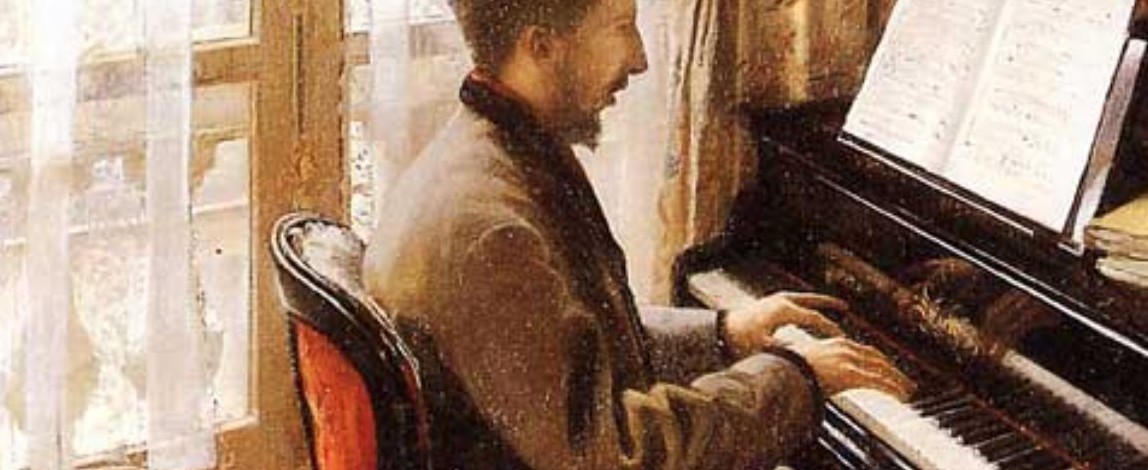
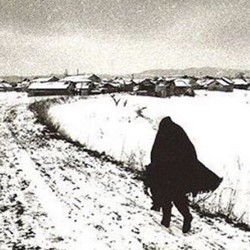
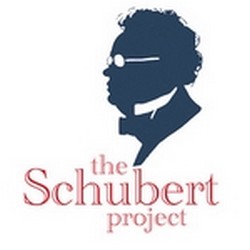
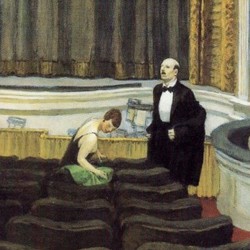












Comments powered by CComment